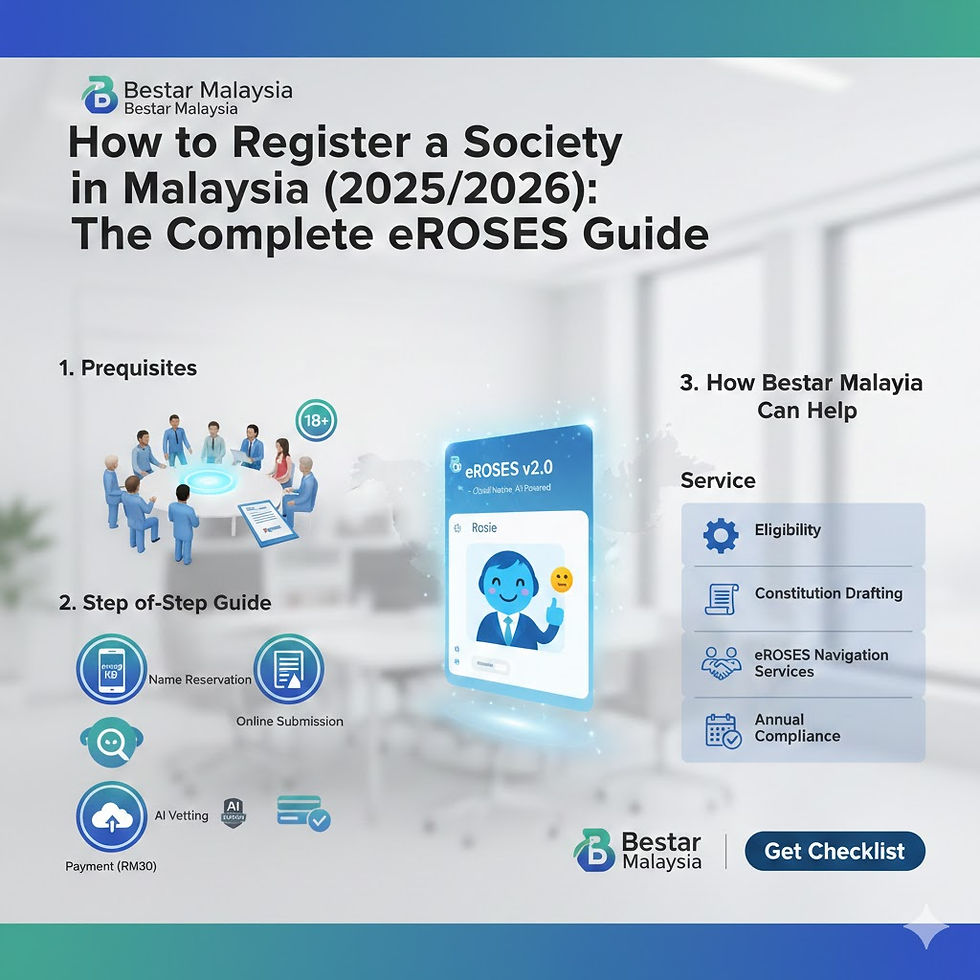Malaysian Dual-Class Share Structure
- Roger Pay
- Jun 16, 2025
- 5 min read

Malaysian Dual-Class Share Structure Explained
Malaysia has been moving towards allowing and facilitating Dual-Class Share (DCS) structures, particularly to encourage high-growth technology companies to list on Bursa Malaysia. While the concept of "one share, one vote" has traditionally been the norm, the Companies Act 2016 provides flexibility for companies to issue different classes of shares with varying rights, including voting rights.
Here's a breakdown of the Malaysian Dual-Class Share structure:
1. What are Dual-Class Shares (DCS)?
DCS involve a company issuing at least two classes of shares, typically Class A and Class B.
Class A shares (often held by the public) usually have limited voting rights (e.g., one vote per share).
Class B shares (often held by founders, key executives, or early investors) grant significantly more voting power (e.g., ten votes per share, or even more in some cases like Grab Holdings Inc. where Class B shares have 45 votes per share).
This structure allows founders to maintain control over the company's strategic direction and long-term vision, even if their equity interest is diluted after raising capital from public markets.
2. Regulatory Framework in Malaysia:
Companies Act 2016: This act allows for the issuance of different classes of shares with varying rights and privileges. Sections 69(d) and 90(1) specifically enable companies to confer special, limited, or conditional voting rights and mandate that the company's constitution prominently state the voting rights attached to each class of shares.
Government's Stance: The Malaysian government, through the Prime Minister and Finance Minister, announced plans to allow the listing of dual-class shares on Bursa Malaysia as part of efforts to encourage local high-growth technology companies to list locally.
Securities Commission Malaysia (SC) and Bursa Malaysia: Both the SC and Bursa Malaysia have been exploring and welcoming these measures, aiming to attract innovative companies and provide investors with more diversified investment opportunities. While specific guidelines for public listing of DCS on Bursa Malaysia are still being developed, private limited companies can already implement DCS structures.
3. Rationale for DCS:
Preserving Founder Control: Allows founders and key stakeholders to retain significant decision-making power and guide the company's long-term vision, free from short-term market pressures.
Attracting Capital: Enables companies to raise substantial capital from public markets without founders losing control, which is crucial for high-growth tech companies.
Protection Against Hostile Takeovers: Concentrated voting power in the hands of insiders can act as a defense mechanism against unwanted takeovers.
4. Concerns and Safeguards:
Minority Shareholder Rights: A key concern is the potential for disproportionate voting power to lead to controlling shareholders not acting in the best interests of all shareholders, and the disenfranchisement of minority shareholders.
Accountability: Critics argue that concentrated control might reduce pressure on management to perform efficiently.
Regulatory Safeguards (Anticipated): Based on practices in other markets like Hong Kong (HKEX) and Singapore (SGX), Malaysia is expected to implement safeguards, which might include:
Capping enhanced voting rights (e.g., maximum of 10 votes per share).
Setting minimum market capitalization requirements for DCS issuers.
Requiring certain matters (e.g., variation of class rights, director appointments, winding-up) to be decided on a "one share, one vote" basis.
Enhanced disclosure requirements in prospectuses, listing documents, and annual reports to inform investors of the DCS structure and associated risks.
Unique stock codes to distinguish DCS companies.
5. Examples:
While primarily listed on NASDAQ, Grab Holdings Inc. is a prominent example of a company with a dual-class share structure co-founded by Malaysians. Its structure allows co-founder Anthony Tan to maintain majority voting power despite a relatively small ordinary shareholding, demonstrating how differential voting rights can be used to maintain founder control.
In essence, Malaysia is adapting its corporate landscape to accommodate modern capital-raising strategies, recognizing the need to balance founder control with investor protection to attract and retain high-growth companies.
How Bestar can Help
Bestar plays a crucial role in the successful implementation and navigation of Dual-Class Share (DCS) structures in Malaysia. Our expertise is vital for both companies considering a DCS and investors evaluating such opportunities. Here's how Bestar can help:
Drafting Company Constitution: Crucial for establishing the DCS framework within the company's constitution, meticulously outlining the rights, privileges, and restrictions of each share class (e.g., voting rights, dividend rights, liquidation preferences, conversion rights).
Compliance with Companies Act 2016: Ensuring that the DCS structure adheres to all relevant provisions of the Companies Act 2016, particularly regarding the issuance of shares with different rights (Sections 69(d) and 90(1)).
Regulatory Compliance for Listing: Advising on and ensuring compliance with the evolving listing requirements of Bursa Malaysia and guidelines from the Securities Commission Malaysia (SC) for public listing of DCS companies. This includes prospectus drafting and regulatory submissions.
Shareholders' Agreements: Drafting or reviewing shareholders' agreements, especially for private companies or pre-IPO stages, to solidify the rights and obligations of different shareholder groups, particularly founders holding high-vote shares.
Corporate Governance Framework: Advising on best practices for corporate governance in a DCS environment, including the establishment of independent board committees, review mechanisms, and conflict-of-interest policies to protect minority shareholders.
Due Diligence: Conducting legal due diligence for investors assessing a DCS company, ensuring the legality and enforceability of the share structure.
Structuring the IPO/Listing: Advising companies on the optimal structure of their initial public offering (IPO) or listing on Bursa Malaysia, including the design of the DCS to meet both founder control objectives and market acceptability.
Valuation: Performing valuations of companies with DCS, considering the implications of differential voting rights on share price and investor appeal.
Fundraising Strategy: Developing comprehensive fundraising strategies that incorporate the DCS structure, identifying potential investors, and managing the entire IPO process.
Market Sounding: Gauging investor appetite and feedback for a DCS offering, helping to fine-tune the terms of the listing.
Financial Reporting: Ensuring that financial statements accurately reflect the company's financial position, performance, and cash flows, especially considering any unique aspects arising from the DCS structure (e.g., specific disclosures related to share capital).
Compliance with Accounting Standards: Ensuring adherence to Malaysian Financial Reporting Standards (MFRS) or International Financial Reporting Standards (IFRS).
Internal Controls: Advising on and auditing robust internal control systems, which are particularly important in DCS companies to prevent potential abuses of power by controlling shareholders.
Tax Implications: Advising on the tax implications of issuing different classes of shares for both the company and shareholders.
Maintaining Statutory Records: Ensuring accurate and up-to-date maintenance of the company's statutory registers, including the register of members which details the different classes of shares and their holders.
Board and Shareholder Meeting Administration: Facilitating the proper conduct of board meetings and shareholder meetings, ensuring compliance with meeting procedures, particularly when different voting rights are involved.
Regulatory Filings: Handling all necessary filings with the Companies Commission of Malaysia (SSM) and Bursa Malaysia, ensuring timely and accurate submission of documents related to share capital and corporate changes.
Governance Support: Providing essential support to the board in upholding corporate governance best practices.
Developing Robust Governance Frameworks: Designing and implementing strong corporate governance frameworks that mitigate the risks associated with concentrated control in DCS companies. This includes recommendations on board composition, independent directorships, audit committees, and remuneration committees.
Risk Assessment: Identifying and assessing potential risks arising from the DCS structure, such as conflicts of interest, related party transactions, and potential for minority shareholder oppression.
Compliance Programs: Developing and implementing compliance programs to ensure adherence to all relevant laws, regulations, and internal policies.
Stakeholder Engagement: Advising on strategies for effective engagement with all stakeholders, including minority shareholders, to ensure transparency and trust.
Strategic Communication: Crafting clear and compelling narratives around the DCS structure for investors, media, and the public, explaining its rationale and the safeguards in place.
Crisis Management: Preparing for and managing potential negative perceptions or criticisms related to the DCS structure.
Investor Education: Developing materials and initiatives to educate the market on the specificities of the company's DCS, ensuring transparency.
In summary, Bestar provides the technical, professional, financial, and strategic expertise necessary to navigate the complexities of Dual-Class Share structures. Our involvement is critical for companies seeking to implement such a structure, for investors looking to understand their rights, and for ensuring the overall integrity and stability of the capital market.



Comments